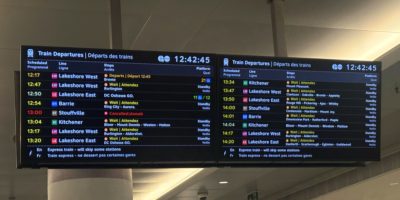By The News Team
The funky fumes from the grates on Gould Street. The insecure RU_Secure Wi-Fi. The escape room that is Kerr Hall.
While some things have stayed the same at Ryerson University, others have changed over the last few months. Here’s what happened this summer:
Canada-Saudi Arabia dispute affects Ryerson students
More than 60 Ryerson students have been impacted by Saudi Arabia’s cancellation of its international scholarship program with Canada.
As an act of retaliation against Canada criticizing the country’s human-rights record, the Saudi Arabian government announced it would withdraw all Saudi students it had been sponsoring at Canadian universities and colleges in early August.
Of the 79 students with Saudi Arabian citizenship enrolled at Ryerson, 62 are impacted, a university spokesperson told The Eye.
The international dispute developed after Foreign Affairs Minister Chrystia Freeland and her department called for a jailed civil rights activist to be released on Twitter.
Ryerson Faculty Association wins legal battle against university
The Ryerson Faculty Association (RFA) won a legal dispute against the university in June when an arbitrator ruled student evaluations are unfair measures of an instructor’s effectiveness due to biases.
Although student evaluations are easy to administer and appear objective, “appearances are somewhat deceiving,” the June 28 ruling reads. Arbitrator William Kaplan said student evaluations are skewed by classroom characteristics like class size, course content and whether a course is an elective or mandatory one. The ruling also states an instructor’s personal characteristics such as accent, age, attractiveness, gender and race unfairly affect evaluations.
As a result, the arbitrator ordered that Ryerson can no longer use such survey results to evaluate a staff member’s teaching effectiveness for promotion or tenure.
The RFA is “pleased” with the arbitrator’s recent decision regarding the surveys, RFA president Ron Babin said in a statement to The Eye. “We are now in discussions with Ryerson University administration regarding implementing the arbitrator’s decision,” said Babin.
Ryerson unveils plaque recognizing its racist history
A Truth and Reconciliation plaque was installed beside the Egerton Ryerson statue this summer to recognize the role the man the university is named after played in the residential school system.
The plaque outlines Ryerson’s involvement in the design and implementation of the government-run schools, whose aim was to decimate Indigenous culture, and the atrocities committed against children who attended the schools.
Its installation fulfills one of the recommendations put forward by a Ryerson community consultation of the Truth and Reconciliation Commission.
Elder Joanne Dallaire, Indigenous community members and university president Mohamed Lachemi revealed the plaque, located near the statue on Gould Street, at an on-campus unveiling ceremony June 25.
Indigenous-led think tank launches at Ryerson
In June, Jorgenson Hall became home to the first Indigenous-led think tank in Canada.
Led by Hayden King, a member of the Anishinaabe from Beausoleil First Nation, the Yellowhead Institute provides critical analysis on land and governance policies that affect First Nations.
The think tank published its first report on the federal government’s move to scrap the Indian Act and the new Indigenous rights framework on June 5. It’s being funded by Ryerson through both the Faculty of Arts’ operating budget and Ryerson’s main budget.
“We need to centre First Nation perspectives on issues that affect them,” King told The Eye shortly after the institute’s launch. “Often in Canada, it’s non-Indigenous policy analysts and pundits who are influencing government and speaking to the media on our behalf, so we’re hoping to change that.”
RSU quietly increases their financial authority, student politician salaries
The meeting was held in Orillia, Ont., during an RSU retreat inaccessible to the public. Student politicians addressed the motions delayed from the RSU Annual General Meeting (AGM) in April because the AGM didn’t reach quorum. That meant RSU executives could pass or reject motions without student votes at the private retreat.
The executive team will now earn $47,000 a year with benefits, a 30.5 per cent increase from last year. The 2017-2018 executive team made $36,000 each per annum.
Also on the agenda was a motion moved by vice-president operations Savreen Gosal, which allows the executive team to spend more money in accordance to their 2018-2019 operating budget.
Executive members can now spend up to $5,000, up from a $1,500 limit. There is little supervision on how the money is spent under the RSU’s financial policy.
Ryerson hosts white privilege conference, protestors
Ryerson hosted the White Privilege Conference (WPC), the first of its kind in Canada, May 9-12.
Anti-oppression advocates Desmond Cole and Adrien K. Wing spoke at the WPC, the four-day event that served as a platform for discussions about racial issues and other forms of societal discrimination. There were also film screenings and workshops such as Exploring Intersections of Privilege: White and Hearing at his year’s conference.
“One of the most valuable attributes of a university is that controversial subjects are discussed publicly, attitudes are challenged and alternatives are suggested and considered,” said Dayo Kefentse, director of communication for the office of the vice-president, equity and community inclusion at Ryerson.
Around two dozen protestors came to campus with picket signs alleging the WPC was racist against white people, promoted hate and aimed to indoctrinate young students through its workshops.
Ryerson grad enters mayoral race
Days after exams ended, human rights lawyer Saron Gebresellassi—who graduated from Ryerson University’s radio and television arts program in 2008—registered to run for mayor of Toronto.
Gebresellassi represented Gilary Massa, a former Ryerson Students’ Union employee who was fired during her maternity leave, in a 2016 legal battle.
She’s running against incumbent mayor John Tory, former chief planner for the City of Toronto Jennifer Keesmaat, public transit advocate Sarah Climenhaga and infamous neo-Nazi Faith Goldy.
If elected Oct. 22, the Eritrean-Canadian would make history as Toronto’s first Black female mayor.












Leave a Reply